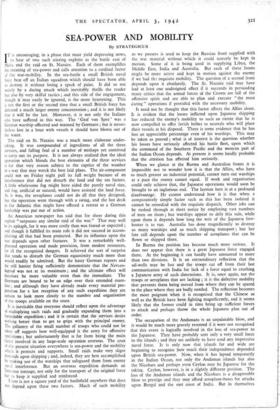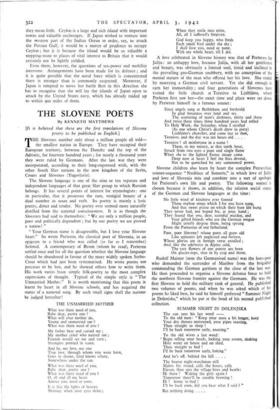SEA-POWER AND MOBILITY
By STRATEGICUS
IT is encouraging, in a phase that must yield depressing news, to hear of two such stirring exploits as the battle east of Malta and the raid on St. Nazaire. Each of them exemplifies
the meaning of sea-power and calls attention to a cardinal factor of the war-mobility. In the sea-battle a small British naval force beat off an Italian squadron which should have been able to destroy it _without losing a speck of paint. It did so not merely by a daring attack which inevitably thrills the reader but also by very skilful tactics ; and this side of the engagement, though it may easily be ignored, is the more heartening. This is not the first or the second time that a small British force has defeated a much larger enemy concentration ; and it is not likely that it will be the last. Moreover, it is not only the Italians who have suffered in this way. The 'Graf von Spec' was a German warship officered and manned by Germans ; but it never- theless lost in a bout with vessels it should have blown out of the water.
The raid on St. Nazaire was a much more elaborate under- taking. It was compounded of ingredients of all the three services, and falling foul of a number of mishaps yet contrived to carry out its purpose. It is not always realised that the ideal operation which blends the best elements of the three services is for that very reason subject to the caprice of the weather in a way that may wreck the best laid plans. The air-component could not on Friday night pull its full weight because of an interference that did not disturb the land and the sea factors. A little wholesome fog might have aided the purely naval sine, and fog, artificial or natural, would have assisted the land force. As it was, the aeroplanes could not do all that they designed, but the operation went through with a swing, and the last dock in the Atlantic that might have offered a retreat to a German battleship was put out of action.
An American newspaper has said that for sheer daring this exploit "surpasses any similar raid of the war." That may well be its epitaph, for it was more costly than was feared or expected ; and though it fulfilled its main role it did not succeed in accom- plishing all that had been projected. But its influence upon the war depends upon other features. It was a remarkably well- planned operation and made provision, from modest resources, for all the recognised dangers. It achieved the sort of surprise that tends to disturb the German equanimity much more than would readily be admitted. But the hasty German reports and he still hastier firing sufficiently demonstrate that the Nerven- kapital was not at its maximum ; and the ultimate effect will therefore be more valuable even than the immediate. The Germans are bound to be on edge over their extended coast- line ; and although they have already made every material pre- paration for a hot reception of any such expedition they are certain to look more closely to the number and organisation of the troops available on the coast.
It is inevitable that everyone should reflect upon the advantage of multiplying such raids and gradually expanding them into a formidable expedition ; and it is certain that the' services desire nothing better than to get to grips with the principal enemy. The gallantry of the small number of troops who could not be taken off suggests how well-equipped is the army for offensive operations ; but unfortunately that is far from being the main factor involved in any large-scale operation overseas. The crux of the present situation everywhere is sea-power and the mobility Which it protects and supports. Small raids make very slight demands upon shipping ; and, indeed, they are best accomplished by making use of the warships that safeguard them from enemy naval interference. But an overseas expedition demands an immense tonnage, not only for the transport of the original force but to keep it supplied and reinforced. There is not a square yard of the battlefield anywhere that does not depend. upon these two factors. Much of such mobility as we possess is used to keep the Russian front supplied with the war material without • which it could scarcely be kept in motion. Some of it is being used in supplying Libya, the Middle East, India and Australia. But each of these fronts might be more active and kept in motion against the enemy if we had the requisite mobility. The question of a second front depends upon it absolutely. The St. Nazaire raid may have had at least one undesigned effect if it succeeds in persuading many critics that the armed forces of the Crown are full of the offensive spirit and are able to plan and execute "the most daring" operations if provided with the necessary mobility.
It need not be thought that this factor affects the Allies alone. It is evident that the losses inflicted upon Japanese shipping has reduced the enemy's mobility to such an extent that he is now compelled to offer lavish bribes to neutrals who will place their vessels at his disposal. There is some evidence that he has lost an appreciable percentage even of his warships. This may be taken as proved ; what is of interest is the question whether his losses have seriously affected his battle fleet, upon which the command of the Southern Pacific and the western part of the Indian Ocean depends. At present it seems hardly probable that the attrition has affected him seriously.
When we glance at the Burma and Australian fronts it is impossible not to wonder how it is that the Allies, who have so much greater an industrial potential, cannot turn out warships at a pace the enemy cannot equal. If work and organisation could only achieve that, the Japanese operations would soon be brought to an inglorious end. The layman here is at a profound disadvantage. He cannot understand how it is that when a comparatively simple factor such as this has been isolated it cannot be remedied with the requisite dispatch. Other jobs can be rushed through at short notice by employing vast numbers of men on them ; but warships appear to defy this rule, while upon them it depends how long the writ of the Japanese free- booter is to run. Australia has done magnificently to destroy so many warships and so much shipping transport ; but her fate still depends upon the number of aeroplanes that can be flown or shipped there.
In Burma the position has become much more serious. It does not appear that there is a great Japanese force engaged there. At the beginning it can hardly have amounted to more than two divisions. It is an extraordinary reflection that the oil-wells may be lost and the troops cut off from their last communication with India for lack of a force equal to crushing a Japanese army of such dimensions. It is, once again, not the troops or aeroplanes that are lacking ; it is the defective mobility that prevents them being moved from where they can be spared to the place where they are badly needed. The reflection becomes the more poignant When it is recognised that the Chinese as well as the British have been fighting magnificently, and it seems likely that the former could in time bring up sufficient forces to attack and perhaps throw the whole Japanese plan out of order.
The occupation of the Andamans is an unpalatable blow, and it would be much more gravely resented if it were not recognised that this event is logically involved in the loss of sea-power to the Japanese. They have probably sent only a very small force to the islands ; and they are unlikely to have used any impressive naval force. It is only now that islands far and wide are beginning to recognise how much their independence depended upon British sea-power. Now, when it has lapsed temporarily in the Indian Ocean, not only the Andaman islands but also the Nicobars and perhaps even Ceylon may be Japanese for the taking. Ceylon, however, is in a slightly different position. The loss of the Andaman islands and the Nicobars is a disagreeable blow to prestige and they may afford aeroplane-bases for attacks upon Bengal and the east coast of India. But in themselves they mean little. Ceylon is a large and rich island with important towns and valuable anchorages. If Japan wished to venture into the western part of the Indian Ocean in order, say, to attack the Persian Gulf, it would be a matter of prudence to occupy Ceylon ; but it is because the island would be so valuable a stepping-stone to places of vital interest to Britain that it would certainly not be lightly yielded.
Even there, however, the questions of sea-power and mobility intervene. Arrangements have been made for its defence ; and it is quite possible that the naval force which is concentrated there is stronger than is commonly suspected. Moreover, if Japan is tempted to move her battle fleet in this direction she has to recognise that she will lay the islands of Japan open to attack by the United States navy, which has already raided up to within 9oo miles of them.



























 Previous page
Previous page